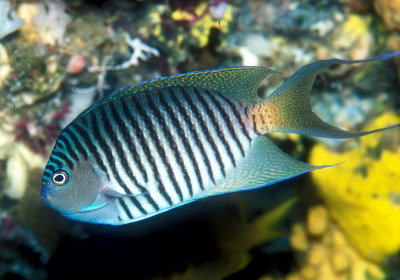Black Spot Angelfish
Category: Angelfish

Facts about Black Angelfish, "Scientific name for Black Angelfish is Pterophyllum scalare". Black Angelfish is a variety of damselfish that belongs to the Pomacentridae family. The Black Angelfish varieties are the captive breeds of the United States, and they are commonly called as Parma alboscapularis or the black scalyfin. The Black Angelfish are largely found around the northeastern parts of New Zealand at low depths over shallow rock-strewn reef regions. When kept in an aquarium, the Black Angelfish breeds prefer a tank with a minimum capacity of 30 gallons (114 liters), with the temperature of the water, ranging from 75 degree Fahrenheit to 82 degree Fahrenheit (24 to 28 cel), with the water pH levels between 5.8 and 7.0.
Features
When matured, the average-sized and semi-violent Black Angelfish breed is capable of attaining a maximum body length that ranges from 9 1/2 to 11 inches (24 cm to 28 cm), measured from the tip of the nose of the Black Angelfish to the foot of its tail. The Black Angelfish varieties have a black colored body, with elongated flowing fins that are highlighted with a gorgeous black lace.
Diet
Black Angelfish breeds are omnivores, and in the aquarium, they are fed with a variety of foods, such as vegetables in addition to meaty foods. The Black Angelfish are also fed with high-quality flake foods in addition to frozen and live foods, such as bloodworms and brine shrimp.
Breeding
During breeding in an aquarium, Black Angelfish breeds prefer innumerable angels in the similar aquarium pending the development of a couple. After the development of a couple, the Black Angelfish need a flat surface to lay their eggs. A big plant leaf, a piece of slate, or even a flowerpot is supposed to be placed at an angle of 30 degrees in a region of reasonable water flow. While the female Black Angelfish will lay the eggs, the male fish will track behind to fertilize. The eggs hatch after three days, and the fry will come out. In the aquarium, the fry are fed with recently hatched brine shrimp pending they grow big enough to acknowledge the compressed flake food.
The average lifespan of the Black Angelfish breed is more than 5 years.
Aquarium care
Test the water when preparing your tank for your Black Angelfish: You will need to purchase a liquid tester so that you can test for Nitrates and Ammonia. The strip-style test kits are unreliable and a waste of money. You should use a dechlorinating product to remove the harmful chlorine from the water. Test for nitrite, ammonia, and proper PH. The ammonia should always be 0, the nitrite should be 0, and the nitrate should preferably be below 10 ppm. If it's at or above 20 ppm, you have too many fish or are not changing the water often enough. Cycling your tank is important, Follow the steps to cycle your tank. This establishes healthy bacterial and chemical levels.
When buying your Black Angelfish see which one looks like the healthier fish. Be wary of tanks with dead fish in them, as this can be a sign of illness or improper care. Clamped fins are a sign of illness. In addition, healthy Black Angelfish will have no white spots, make sure they swim with their fins held upright, and have a nice rich color or colors. Make sure they swim all over the tank and look healthy.
When adding the Black Angelfish to the aquarium, it is important to introduce the Black Angelfish to the tank environment slowly. As soon as you get home, float the entire, closed pet store bag (with the fish inside!) in the tank on top of the water for about a half hour. This will allow the water in the plastic bag and the Black Angelfish to equalize out to the same temperature as in your tank, so your fish does not get shocked by the different temperature. Next, add a small amount of water from your tank to the bag, and wait about 15 minutes. Do this at least one more time. Us a net to catch your Black Angelfish and then while the Black Angelfish is in the net, dispose of all the water down a drain or outside. Then transfer the Black Angelfish carefully into the your tank. This process not only reduces stress for you Black Angelfish, it also prevents the dirty pet store water from contaminating your tank with disease.

 Back To Category Angelfish
Back To Category Angelfish